- Home
- Joanne Harris
Jigs & Reels: Stories Page 2
Jigs & Reels: Stories Read online
Page 2
Even the obligatory bathroom stop was a revelation: clean, gleaming tiles, flowers, fluffy pink towels, scented hand cream, perfume. I sprayed Hope with freesias and looked at us both in one of the big shiny mirrors. I’d expected us to look drab, maybe even a little foolish, in our nursing-home cardies and sensible skirts. Maybe we did. But to me we looked changed, gilded: for the first time I could see Hope as she must have been; I could see myself.
We spent a long time in Fortnum’s. We visited floors of hats and scarves and handbags and dresses. I imprinted them all into my memory, to bring out later with Hope. She wheeled me patiently through forests of lingerie and coats and evening frocks like a breath of summer air, letting her thin, elegant fingers trail over silks and furs. Reluctantly we left: the streets were marvellous, but lacked sparkle; looking at the people rushing past us, haughty or indifferent, once again I was almost afraid. We hailed a taxi.
I was getting nervous now; a prickle of stage fright ran up my spine and I unfolded the paper again, its folds whitened by much handling. Once more I felt drab and old. What if the shop assistant wouldn’t let me in? What if they laughed at me? Worse still was the suspicion – the certainty – that the shoes would be too expensive, that already I’d overspent, that maybe I hadn’t even had enough to begin with . . . Spotting a bookshop, glad of the diversion, I stopped the cab and, with the help of the driver, we got out and bought Hope a copy of Lolita.
No one said it might be unsuitable. Hope smiled and held the book, running her fingers over the smooth unbroken spine. ‘How good it smells,’ she said softly. ‘I’d almost forgotten.’
The cab driver, a black man with long hair, grinned at us. He was obviously enjoying himself. ‘Where to now, ladies?’ he asked.
I could not answer him. My hands trembled as I handed over the magazine page with the Knightsbridge address. If he’d laughed I think I would have wept. I was close to it already. But the driver just grinned again and drove off into the blaring traffic.
It was a tiny shop, a single window with glass display shelves and just one pair of shoes on each. Behind them, I could see a light interior, all pale wood and glass, with tall vases of white roses on the floor.
‘Stop,’ I told Hope.
‘What’s wrong? Is it shut?’
‘No.’
The shop was empty. I could see that. There was one assistant, a young man in black, with long, clean hair. The shoes in the window were pale green, tiny, like buds just about to open. There were no prices on any of them.
‘Onwards!’ urged Hope in her Cambridge voice.
‘I can’t. It’s—’ I couldn’t finish. I saw myself again, old and colourless, untouched by magic.
‘Unsuitable,’ barked Hope scornfully, and wheeled me in anyway.
For a second I thought she was going to hit the vase of roses by the door. ‘Left!’ I yelled, and we missed them. Just.
The young man looked at us curiously. He had a clever, handsome face, but I was relieved to see that his eyes were smiling. I held up the picture.
‘I’d like to see – a pair of these,’ I told him, trying to copy Hope’s imperious tone, but sounding old and quavery instead. ‘Size four.’
His eyes widened a little, but he did not comment. Instead he turned and went into the back of the shop, where I could see shelves of boxes waiting. I closed my eyes.
‘I thought I had a pair left.’
He took them carefully out of their box, all sucked-sweet shiny and red, red, red.
‘Let me see them, please.’
They were like Christmas baubles, like rubies, like impossible fruit.
‘Would you like to try them on?’
He did not comment on my wheelchair, my old and lumpy feet in their porridge-coloured slip-ons. Instead he knelt in front of me, his dark hair falling around his face. Gently he removed my shoes. I know he could see the veins worming up my ankles and smell the violet scent of the talc that Hope rubs into my feet at bedtime. With great care he slipped the shoes onto my feet; I felt my arches push up alarmingly as the shoes slid into place.
‘May I show you?’ Carefully he stretched out my leg so that I could see.
‘Ginger Rogers,’ whispered Hope.
Shoes for strutting, sashaying, striding, soaring. Anything but walking. I looked at myself for a long time, fists clenched, a hot fierce sweetness in my heart. I wondered what Tom would say if he saw me now. My head was spinning.
‘How much?’ I asked hoarsely.
The young man told me a price so staggering that at first I was sure I’d misheard; more than I’d paid for my first house. I felt the knowledge clang deep at my insides, like something falling down a well. ‘I’m sorry,’ I heard myself saying from a distance. ‘That’s a little too dear.’
From his expression I guessed he might have been expecting it.
‘Oh, Faith,’ said Hope softly.
‘It’s all right,’ I told them both. ‘They didn’t really suit me.’
The young man shook his head. ‘You’re wrong, Madam,’ he told me, with a crooked smile. ‘I think they did.’
Gently he put the shoes – Valentine, racing-car, candy-apple red – back into their box. The room, light as it was, seemed a little duller when they had gone.
‘Are you just here for the day, Madam?’
I nodded. ‘Yes. We’ve enjoyed ourselves very much. But now it’s time to go home.’
‘I’m sorry.’ He reached over to one of the tall vases by the door and removed a rose. ‘Perhaps you’d like one of these?’ He put it into my hand. It was perfect, highly scented, barely open. It smelt of summer evenings and Swan Lake. In that moment I forgot all about the red shoes. A man – one who was not my son – had offered me flowers.
I still have the white rose. I put it in a paper cup of water for the train journey home, then transferred it to a vase. The yellow chrysanths were finished, anyway. When it fades I will press the petals – which are still unusually scented – and use them to mark the pages of Lolita, which Hope and I are reading. Unsuitable, it may be. But I’d like to see them try to take it away.
The Ugly Sister
I’ve always felt some degree of sympathy for Cinderella’s Ugly Sisters. And I’ve always felt that there was more to their tale than the story books, cartoons and pantomime shows would have us believe.
IT’S NOT EASY being an ugly sister. especially not at Christmas, smack in the middle of the pantomime season, with all its glitter and fakery and hissing and booing and tawdry old jokes and oooh yes it is, and ooooh no it isn’t, behind you, behind you. Plus being spat at by shrieking sticky children with ice cream all over their faces, or pelted with flour by a girl in Prince’s clothing before all going round to Cinderella’s Dance-a-Rama for pie, peas and Happy Hour after the show.
No thanks.
Of course, it was worse in the old days. That fellow Grimm has a lot to answer for, and so do Perrault and his simple-minded translator. Glass slippers, my foot. Those pantoufles de verre have been the bane of my life ever since, and never mind that they were originally vair, as in white ermine, which would have been much easier on the arches (and might even have fitted, which would really have put one over on that Prince and his little floozy). No, the old days were savage, with crows to peck out our eyes – after the wedding, of course; wouldn’t want anything to spoil Her Smugness’s Big Day – and righteous torment for the ungodly.
Nowadays, of course, we have trial by Disney, which is almost as bad: evil becomes ridiculous faced with so many pratfalls and flour bombs. There’s no dignity left in being a villain. Instead it’s just another Christmas crowd in Bolton-on-Dearne or Barnsley Civic Hall, featuring third-rate soap-opera has-beens and some bloke who once appeared on Opportunity Knocks.
But I don’t complain; I’m a professional. Not like these fairweather artistes, killing time out of season between walk-on parts. It is a proud and lonely thing to be an Ugly Sister, and don’t you ever forget it.
We
– my sister and I – were born somewhere in Europe. Accounts differ. In any case, no one cares much about our history. Or, for that matter, what happens to us when the curtain goes down. There’s no ever after for an Ugly Sister, let alone a happy.
Our father adored us; our mother had ambitions, like all mothers, to see us settled (preferably a comfortable distance away). Then came tragedy. A fall from his horse killed our indulgent father. Mother remarried, to a widower with one daughter, and here the story begins in earnest. You know it, of course. At least, you know her version: how the widower died; how we then oppressed the daughter, a charming waif called Cinders; how we made her skivvy for us and sew for us and cook our enormous meals; how we callously denied her the opportunity to be Teen Queen at the Palace All-Nite Disco; the mice, the dress, the Fairy Godmother; all that drivel.
I said drivel. That wasn’t the story at all.
Oh, she was quite pretty, in a sickly sort of way. Bottle-blonde, skinny, as pale and delicate as we were strapping. She did it on purpose: ate nothing but raw food, always dressed in black, exercised compulsively. You’ve never seen such clean floors (apparently sweeping burns 400 calories an hour, polishing 500). She rarely spoke to us, but listened raptly to the minstrels who came by with their tales of romance, and never missed the penny plays every Sunday morning in the village square. Boys liked her (of course); but she wanted a prince. Village boys not good enough for Miss High and Mighty.
Of course we hated her. We were both quite ordinary looking (they made us out to be ugly later, out of spite). Bits of us jiggled when we ran. We had poor complexions and bushy hair that no amount of blow-drying would straighten. Mistress Smuggerella was toned, sleek, a perfect size eight. Anyone would have hated her.
Of course she always dressed in rags. She was the type. Besides, that raggy look was very in that season – designer rags that cost a fortune. You had to be thin to carry it off; with my legs I’d have looked like a pantomime cow. And the shoes! If you’d seen the pairs of shoes she had in her wardrobe, not just white ermine but crocodile, mink, plexiglas, ostrich, lizard, silk; all with six-inch heels and little straps even in winter (think what that’ll do to her arches in twenty years’ time) – well, you just wouldn’t have believed it.
Have you ever noticed how history favours the lookers? Henry VIII: bad press. Richard Lionheart: good press. Catherine of Aragon: bad press. Anne of Cleves: good press. Court painters have a lot to answer for, and storytellers too. You know the end: she gets the Prince (who, by the way, was short, fat and balding), the castle, the gold, the white wedding, the rose petals, the whole shebang; we get the crows. Happy Hour ever after.
But it gets worse. I’ve already told you; there is no ever after for an Ugly Sister. Nobody thought to write one, of course; they were too busy swooning over Her Royal Smugness and her perfect tootsies. So what happened to us? Did we just vanish? No, what happened is this: we, the forgotten Sisters – soon to become the Ugly Sisters, the Weird Sisters, and the Sisters of the Divine Comedy – rolled on into legend, picking up blemishes like lint along the way. We skirmished unsuccessfully with Grimm and Perrault, tried a bit of seduction on Tennyson, but again to no avail. We hoped for better in the twentieth century, but, as I said, that was when Disney came along, and by then we were ready to sell our souls for a bit of good press.
But we’re troupers. At least, I am – nowadays my sister plays to the gallery a bit too much for my taste – you’d always see me here at Christmas, in one theatre or another, face gleaming with greasepaint, in powdered wig and giant hooped skirt. I like to think there’s something noble – almost heroic – about my part; a hidden pathos, which only the select few will ever see. Most of them aren’t watching me anyway; they’re watching her, aren’t they, La Smuggette, in her flouncy dress and spangled shoes. When I speak, my lines are usually drowned out by hissing or laughter. But I don’t care. I’m a professional. Beneath my grotesque costume, my mask of paint, a mystery awaits. One day, I tell myself, someone will notice me. One day, my Prince will come.
Last night was Christmas Eve. The best night of the year. Oh, there are shows after that – right until late January – but Christmas Eve is special. After that the magic runs out and depression sets in; everyone feels bloated and sluggish, playing out time at the rag-end of the season. Audiences dwindle. People forget their lines. The show moves away, to Blackpool maybe, or some other out-of-season resort, to moulder quietly until next year. Costumes stored in trunks. Lights packed into cases. But now it was Christmas Eve; everyone was louder, brighter, screamier than usual; the audience hissed and booed with even more vigour, the kids were stickier, the Prince more camp; the pantomime cow more athletic; Buttons more pathetic; and of course dear old Cinders, the star of the show, was sweeter, prettier, daintier, more glittery and fairy-like than ever before.
Only I felt different as the last act approached. My head was aching. I wondered fleetingly whether it wouldn’t be a good idea to get out of the panto business for good; to move away, to retire somewhere out of Europe, where I wouldn’t be recognized.
Fat chance, I thought. There’s no escape for an Ugly Sister.
And still the thought persisted. What was wrong with me tonight? I shook my head to clear it, and for the first time in my long career, something caught me by surprise and I almost fluffed a line.
There was a man watching me from the stalls. Sitting close to the stage, half in shadow; a large, long-haired man, shoulders hunched a little under a shaggy grey overcoat, his eyes fixed upon me.
That was unusual – more than that, astonishing. It was Cinders’ scene; the one where my sister and I primp at the mirror while she sings her mournful song and the animals sit about blatting in sympathy. And yet there was no doubt about it (I dared a second glance through the glass, very darkly): he was looking at me.
Me. I felt my heart give a ridiculous lurch. He was no Prince Charming, that much was obvious; and I could see from the grizzled look of his rough hair that he was no longer young. But he looked strong and powerful, and his big eyes beneath the fall of hair were bright and intent. I felt suddenly very conscious of the ridiculous costume I was wearing, the huge bustle, the oversized shoes, the absurdly padded bosom. He thought me amusing, I told myself sternly; that was all. And yet he was not smiling.
I was conscious of his eyes on me throughout the rest of the scene. When I came back on stage after Cinders’ mawkish duet with her prince, he was waiting for me; then again in the next. When the flour hit me in the face and the audience screamed with mirth, he alone did not laugh. Instead I saw him lower his head, as if in sorrow (I thought) at a fine, proud woman brought low. My heart was beating wildly. I raced through the final scene as if in a daze, reciting my lines automatically, my eyes returning incessantly to the face of the man still watching me from the shadows. Not a handsome face, no; but there was character there, and a kind of wild romance. His hands – so large as to be almost paws – looked capable of gentleness. His eyes gleamed wedding-ring gold in the darkness. I was trembling all over.
The last scene came. Then the curtain call. Linking hands, we all came to the front of the stage for a bow, and as I bent down he stood up and spoke urgently in my ear.
Meet me outside. Please.
I looked around wildly, still half-expecting to see some other woman – some more beautiful, more deserving woman – step forward to receive his message. But he was watching me, his gold-ringed eyes intent. And as I stared at him, quite forgetting the hot and foolish hand of the actor beside me, I saw him nod, as if in answer to an unspoken question.
Me?
Yes, you.
Then he was gone into the crowd, as quickly and silently as a hunter.
We took fourteen curtain calls. Streamers flew past my head, confetti fell, flowers were presented to Her Nibs and the sham Prince Charming. I could see the audience shouting and clapping (with a few stray boos and hisses for you-know-who), but in my head there was a great silence, a great asto
nishment. It was as if an eye I’d never known about had just opened inside my head. After the curtain, I flung aside my wig and hoop and raced wildly for the stage door, certain that he’d be gone, that it had been a joke, that he – whoever he was – had already moved on, taking a piece of my heart with him.
He was waiting in the alley behind the theatre. Neon light from Cinderella’s Dance-a-Rama across the road torched his hair with gaudy colours. The snow crunched beneath my feet as I ran towards him. He stood head and shoulders above me, though I am taller than most. For the first time in my life, I felt small: delicate.
‘I knew straightaway,’ he growled, as I entered the circle of his arms. ‘As soon as I saw you up there. Just like in the stories. Just like magic.’ He was kissing me fiercely as he spoke, nuzzling hungrily against my hair. ‘Come away with me. Come with me now. Leave everything. Take the risk.’
‘Me?’ I whispered, hardly able to breathe. ‘But I’m an Ugly Sister.’
‘I’ve had it with leading ladies. They’re all the same. There was a girl once—’ He stopped, lowering his head as if the memory pained him. ‘I know better now. I’ve learned to see through their disguises.’ He paused again, and looked at me. ‘Yours, too.’
I clung to him as he spoke, my face in the shaggy grey fur of his coat. I could hear my heart pounding more wildly than before.
‘But I’m—’ I began again.
‘No.’ Gently he ran his hand across my face, wiping off the greasepaint with his fingers. ‘You’re not.’

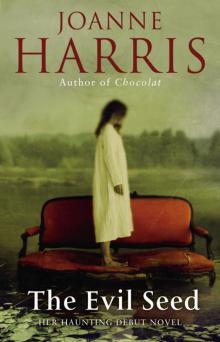 The Evil Seed
The Evil Seed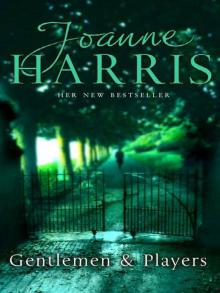 Gentlemen and Players
Gentlemen and Players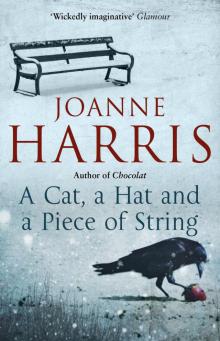 A Cat, a Hat, and a Piece of String
A Cat, a Hat, and a Piece of String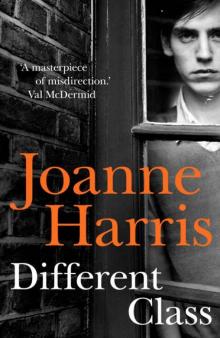 Different Class
Different Class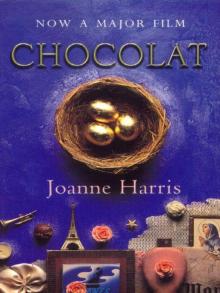 Chocolat
Chocolat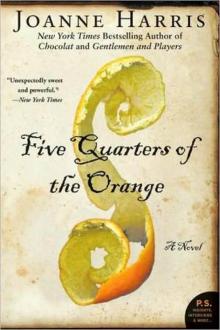 Five Quarters of the Orange: A Novel
Five Quarters of the Orange: A Novel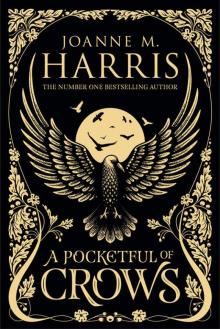 A Pocketful of Crows
A Pocketful of Crows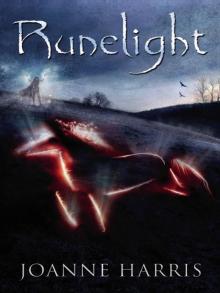 Runelight
Runelight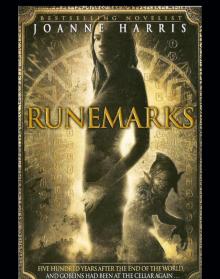 Runemarks
Runemarks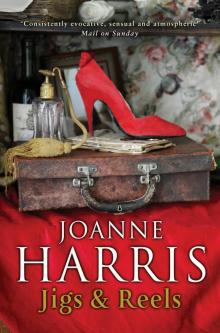 Jigs & Reels: Stories
Jigs & Reels: Stories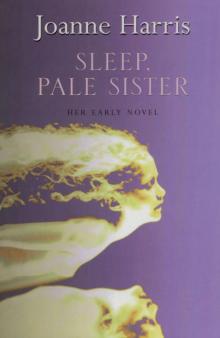 Sleep, Pale Sister
Sleep, Pale Sister Holy Fools
Holy Fools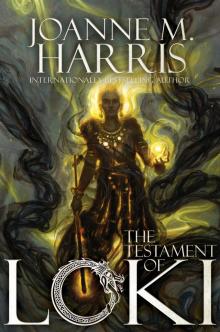 The Testament of Loki
The Testament of Loki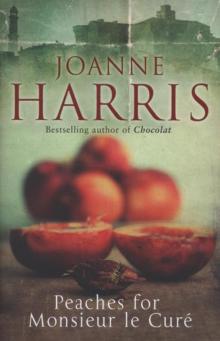 Peaches for Monsieur Le Curé
Peaches for Monsieur Le Curé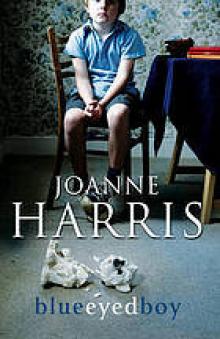 Blueeyedboy
Blueeyedboy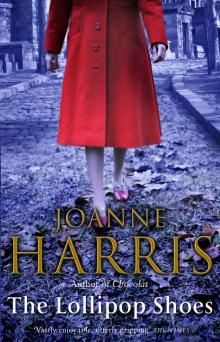 The Lollipop Shoes
The Lollipop Shoes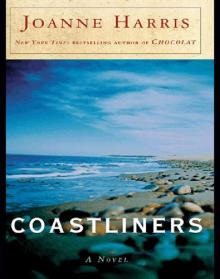 Coastliners
Coastliners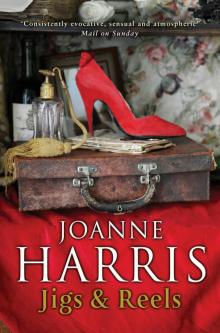 Jigs & Reels
Jigs & Reels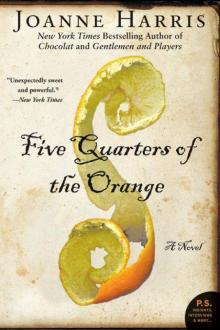 Five Quarters of the Orange
Five Quarters of the Orange